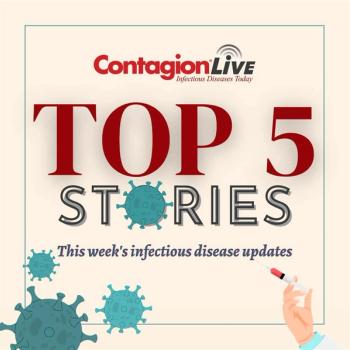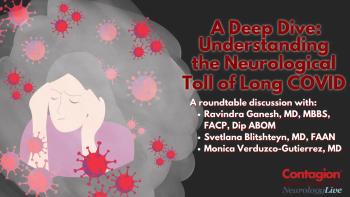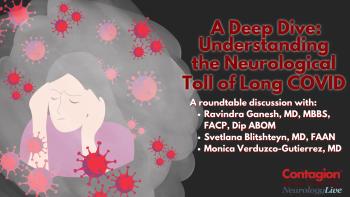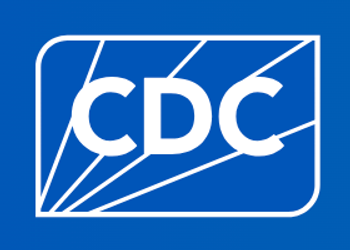
Affected products include Taiwan Enoki mushrooms, select soft-ripened cheeses, and Autumn Turkey Sandwiches.
Abene is currently a freelance writer and editor who contributes to Contagion. She is the former Assistant Editor for Contagion. She can be emailed at: sophiaabene@gmail.com.

Affected products include Taiwan Enoki mushrooms, select soft-ripened cheeses, and Autumn Turkey Sandwiches.

Findings from the CAPELLA study reveal virologic suppression and a safety profile for multidrug-resistant HIV-1.

The combination of the antiviral agents islatravir and lenacapavir demonstrates both efficacy and safety, leading to advancement into Phase 3 trials.

From improving infection control and antibiotic stewardship, identifying RT 027 as a risk factor for vancomycin resistance in C diff, developing a universal flu vaccine, better management for drug-resistant pathogens, and more.

Despite advances in understanding and treating Long COVID, many questions about its mechanisms, susceptibility, and varied recovery patterns remain unresolved, underscoring the need for continued research.

This composite peptide vaccine targets key bacterial toxins to prevent sepsis, enhance antibiotic efficacy, reduce inflammation in diseases and cancer, with further data expected soon.

A five-year study highlights high virologic suppression and well-tolerated treatment in black patients.

A study of carbapenemase-producing organisms found similar rates of infections, highlighting treatment challenges, the role of rapid diagnostics, and surveillance on antimicrobial stewardship due to high mortality rates.

Deborah Birx, MD, and Amy Carenza, BBA, highlight the targeting of multidrug-resistant organisms and tracking of infection trends without increasing staffing needs.

Led by Shruti K. Gohil, MD, MPH, the trials examined how computerized physician order entry prompts can reduce the use of extended-spectrum antibiotics in hospitalized patients while maintaining patient safety.

ActivePure’s Deborah Birx, MD, and Amy Carenza, BBA, discuss their study showing a 99% reduction in fungal colony-forming units, 98% reduction in aerobic bacteria, and a 66% decrease in C auris.

New approach targets multiple strains, promising broad protection against human, avian, and swine influenza viruses.

Sohaib Asghar, MBBS, MD, highlights the role of socio-economic factors and demographic disparities in HIV mortality from 1999 to 2023.

An analysis revealed that 29% exhibited reduced susceptibility to reduced vancomycin, underscoring the importance of enhanced monitoring of these strains to inform antibiotic prescribing practices.

This week, a need for better access to diagnostic technologies for Long COVID, Iterium Therapeutics' discussed their FDA-approved Orlynvah for uncomplicated UTIs, the recent rise in human cases of avian influenza, and more.

Clinicians discussed the complexities of diagnosing Long COVID, emphasizing the need for improved biomarkers and diagnostic technologies to better serve affected patients.

Buddy Creech, MD, MPH, assures that the interim findings of the study indicate adolescents produced a stronger immune response compared to adults, with minimal adverse effects.

The investigational vaccine amezosvatein demonstrated low reactogenicity, supporting its potential as an alternative for shingles prevention in adults 50 and older.

Corey Fishman and Steven Aronin, MD, discussed trial highlights of Orlynvah for uncomplicated urinary tract infections and outlining plans to seek partners for a market launch to address antibiotic resistance and enhance patient treatment options.

The CANOPY Phase 3 clinical trial demonstrated a reduced risk of symptomatic COVID-19, including a 64% reduction during the off-drug follow-up period.

Iterum Therapeutics receives approval for Orlynvah as the first oral penem for treating uncomplicated urinary tract infections in adult women with limited treatment options.

Veterinary and public health officials share the important roles of surveillance and prevention strategies, insights on the virus's transmission pathways, historical context, the One Health approach, and highlights effective precautionary measures to mitigate H5N1 risks.

Ferring presented new real-world data demonstrating that 73.3% of patients reported enhanced physical function and 86.7% experienced better mental well-being.

Reducing the age for pneumococcal vaccination allows more adults to safeguard themselves against pneumococcal disease during a period when their risk of infection significantly rises.

Without a specific tailored Long COVID therapy, individualized treatment based on patient phenotypes, along with extensive evaluations, is essential for effective symptom management.

Links to consumed hamburgers have resulted in 75 infections and one fatality, prompting an investigation of the slivered onions used on these beef patties.

Christine Slover, PharmD discussed cefiderocol's effectiveness against challenging infections, including those caused by multi-drug resistant bacteria.

David Richards emphasized the therapy’s potential to enhance antibiotic effectiveness by targeting bacterial biofilms, a significant challenge in treatment.

Important vaccine updates, including a second COVID-19 vaccine dose for adults 65 and older and immunocompromised individuals, a pneumococcal vaccine for adults aged 50 and older, and more.

Nigel McCracken, PhD, presents a diagnostic test to identify early T cell dysfunction in syndromes like Long COVID and ME/CFS, aiming to improve treatment strategies before symptoms escalate.